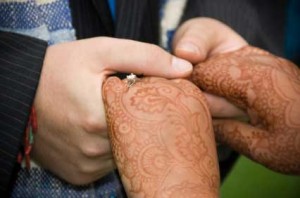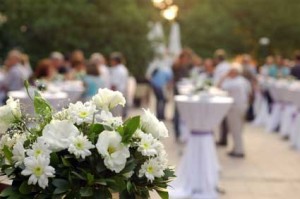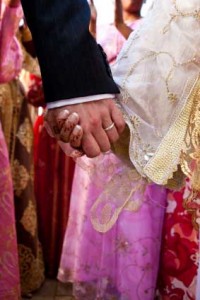Check with your Officiant
Before rolling up your sleeves and writing your own wedding vows, you’ll want to check with your wedding officiant to make sure they don’t mind custom wedding vows. If you don’t yet have an officiant, consider asking a friend or family member to get ordained, so they can preside over your ceremony. Some ministers or churches may require that you use the traditional set of vows, however this isn’t always the case.
Get started early
A wedding vow is a promise that is meant to last a lifetime. If you’re writing your own, don’t wait until the last minute. You’ll want time to write and rewrite your vows until they are perfect. Much of writing is rewriting, and with time you can compose several drafts, each a little better than the last. It helps to set goals, like coming up with a final draft a week before the wedding. This will allow some wiggle room should anything unexpected happen.
Borrow From Tradition
To get ideas flowing, take a look at some traditional wedding vows. You might also want to look at vows from other religions. You can deconstruct traditional vows to get the foundation for your own. Then with your own words you can build up new vows and fashion a script that is to your liking.
 Determine the mood for your wedding vows
Determine the mood for your wedding vows
Will your wedding vows be humorous or serious? Romantic or hopeful? Or a combination? Whatever you decide, make sure it comes from the heart. This will also depend on your spouses’ personality. Keep in mind that if you write humorous vows, make sure they capture the seriousness of the commitment you are entering. Being too silly would undercut the mood during the ceremony.
Technical Aspects
If you and your spouse are writing custom vows, will you be writing them together or separate? Writing together creates the opportunity to play off each other’s words, but writing separately could be better depending on your relationship dynamic. Also, if writing separately you may want to have a third party look them over before the wedding to ensure they are the same length and similar in tone.
Consider the Audience
If you write your own vows you get the freedom to write what you want, but don’t take it too far. If your vows or too personal, the audience might not understand, or may even become embarrassed. A wedding is not just about the couple- friends and family come to witness your union, so make sure the audience can feel included as well.
Practice, practice, practice!
Writing the vows is only half the work; you will want to deliver them eloquently as well! Reciting vows at your wedding is ultimately the same thing as giving a speech in front of all your friends and family. This makes it important to practice out loud, and by doing so you will catch any tongue twisters or sentences that are too long.




 Planning a wedding comes with a lot of stress, but additional worry and difficulties might surface before and during a cross-cultural or inter-faith wedding. The clash of traditions, customs, and radically different ways of life can create quite a storm for the bride and groom.
Planning a wedding comes with a lot of stress, but additional worry and difficulties might surface before and during a cross-cultural or inter-faith wedding. The clash of traditions, customs, and radically different ways of life can create quite a storm for the bride and groom. The wedding reception is a party held after a wedding ceremony. When the ceremony is over, it is customary for the newlywed couple to invite guests who attended the wedding ceremony to a reception. But where does this tradition come from? No matter what cultural or religious tradition, the wedding reception represents the community’s affirmation of the new couple.
The wedding reception is a party held after a wedding ceremony. When the ceremony is over, it is customary for the newlywed couple to invite guests who attended the wedding ceremony to a reception. But where does this tradition come from? No matter what cultural or religious tradition, the wedding reception represents the community’s affirmation of the new couple.

 There are many factors to consider. For example, Muslim dietary requirements must be considered for the reception or refreshment table. Pork products even as an ingredient are forbidden. Alcohol is another forbidden item for the ceremony or reception. As this is a common part of many wedding receptions, it will need to be discussed if the woman’s family is not of the Muslim faith.
There are many factors to consider. For example, Muslim dietary requirements must be considered for the reception or refreshment table. Pork products even as an ingredient are forbidden. Alcohol is another forbidden item for the ceremony or reception. As this is a common part of many wedding receptions, it will need to be discussed if the woman’s family is not of the Muslim faith.